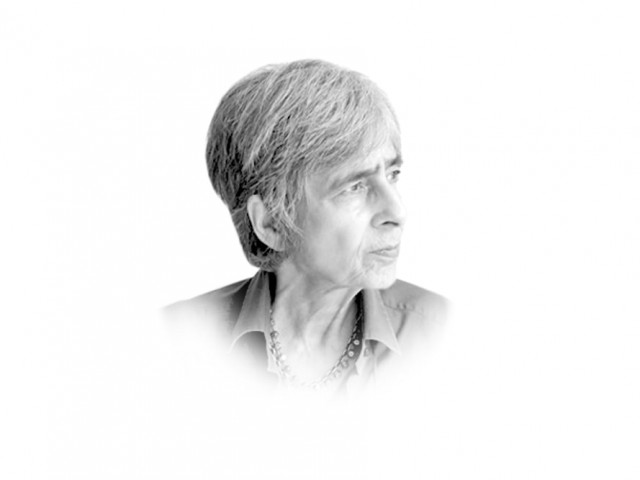Nothing new under the sun
As of now, there is no other visible alternative — other, of course, than our protectors and friends in the barracks.

amina.jilani@tribune.com.pk
Let’s just take this century. What was being said about the state of Pakistan in the year 2000? Well, according to random comments, “Pakistan is falling apart. Venal politicians have sucked the country hollow, leaving the void to be filled by extremists or military coup-makers, with troubling signs of alliances between the two.” “The economy is primitive, corrupt and weakening by the day.” “It is a frustratingly hard place to help.”
Moving to comments at the start of 2014: “Pakistan seems a state not merely in decline, but in terminal decline, mainly because its institutions are broken, its economy lagging, its government finances slipshod, its social indicators deplorable and corruption rampant.” Until the time that the people of Pakistan can get out of their national habit of denial, refuse to tolerate shoddy governance, venal politicians and failing institutions, “outsiders can do little more than stand by as aghast spectators, watching a train wreck in slow motion.”
One set of quotes is from a British publication, the other from a US think tank paper. Over a period of 14 years, from military rule, now despised but then welcomed, to the highly lauded fact that one government in the guise of democracy managed to last out five years and through a somewhat dicey ballot box exercise handed over to another government, also in the guise of democracy, is touted as an outstanding triumph by a well-heeled minority, which has managed to stay either afloat or to high-ride the waves. The beloved awam see it otherwise — but who cares?
The adjective ‘venal’ was used in both cases to describe Pakistan’s politicians. It would seem that yes, this is what the majority of them are. The PPP and the PML have been with us since the 1980s. The common factor that has united them all the way down the decades is corruption, both of which have rubbed off onto their sycophantic supporters. Surely, if a poll were to be taken on the subject, there would be few doubters. The financial acumen of both groupings is far too well known, even documented. But here they are. A great pointer to Pakistan’s failure to cultivate leadership, if that is all we can produce, then sadly, Pakistan deserves each and every nasty thing said about it.
The two parties are different in the money-making stakes at the expense of the national exchequer. One is more professional, more subtle, less glaringly on the make; the other more open and gung-ho about it all. But is it not shame-making that knowing what we know, and the whole world knows, we put up with being ruled and ruined by obscenely (in comparison to the majority) rich dynasties whose sole motivations are power and pelf?
The third alternative that cropped up at the 2013 elections has proven to be a huge let-down. It is doubtful that those who voted for the PTI in May would do the same today. As of now, there is no other visible alternative — other, of course, than our protectors and friends in the barracks, the most united and disciplined party of the land. Herein lies the rub — though the natives of Pakistan are democrats at large, there are a demented few who wish and whisper about a dysfunctional government, confused and lost but which may still harbour, as it did in 1999, the desire to twist religion and justify totalitarianism.
Venality: On the recently released list of Pakistan’s top taxpayers, where were the Sharifs, Zardaris and their cohorts? Nowhere to be found, not a single one. Now, would one not have justification in wondering why — and how?
Published in The Express Tribune, March 1st, 2014.
Like Opinion & Editorial on Facebook, follow @ETOpEd on Twitter to receive all updates on all our daily pieces.















COMMENTS
Comments are moderated and generally will be posted if they are on-topic and not abusive.
For more information, please see our Comments FAQ